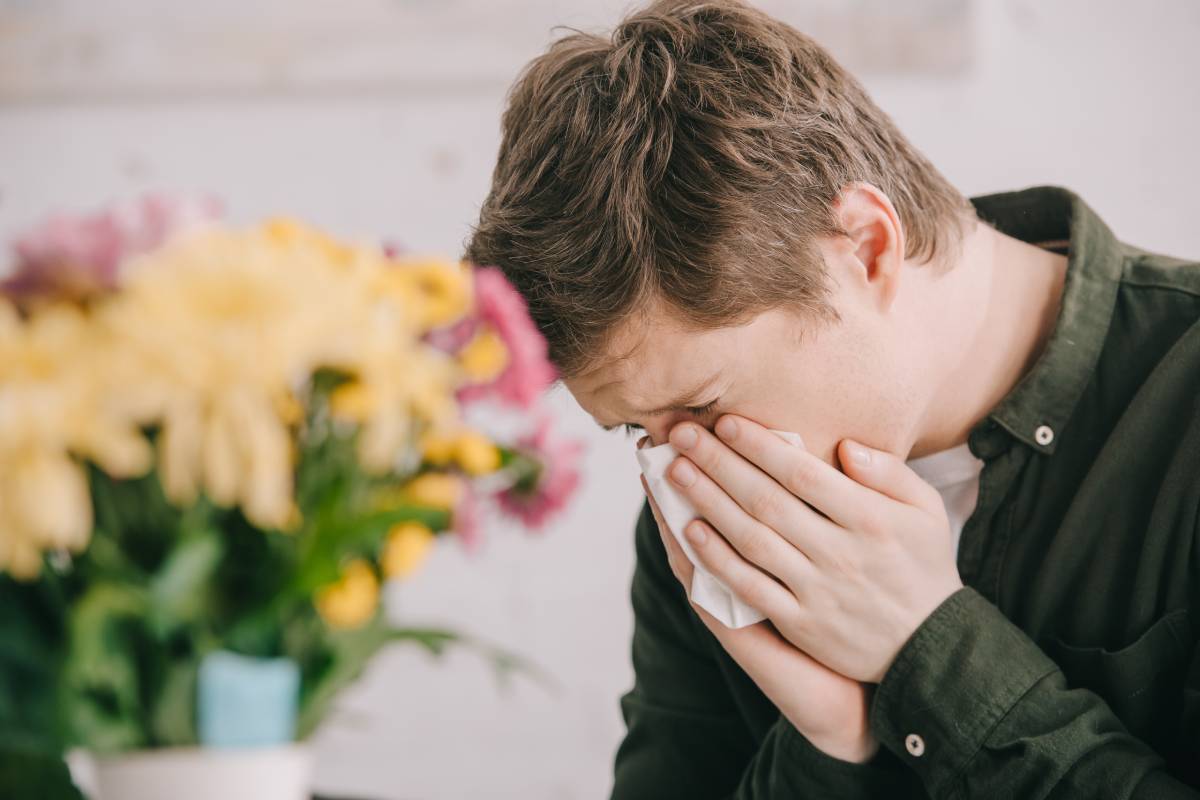Allergies and anxiety are common problems that many people face. Allergies cause symptoms like sneezing, itchy eyes, and trouble breathing. Anxiety is when you feel very worried or scared. Scientists have found that allergies and anxiety are connected. Allergies can make you feel more anxious, and anxiety can make allergy symptoms worse.
This article will explain how allergies and anxiety affect each other, how allergies can sometimes change your mental focus, and why your mind and body work together to cause these effects. It will also give tips on how to manage both allergies and anxiety for better health.
What Are Allergies?

Allergies happen when your body’s immune system reacts to things that are usually harmless. These things are called allergens. Common allergens include pollen from plants, dust mites, pet hair or dander, and certain foods.
When your body meets an allergen, it releases chemicals like histamine. Histamine causes symptoms such as sneezing, runny nose, itchy eyes, skin rashes, or trouble breathing. Some allergies can be very serious, like asthma or anaphylaxis, which need urgent medical care.
What Is Anxiety?
Anxiety is a feeling of worry, nervousness, or fear. Everyone feels anxious sometimes, but anxiety disorders are when these feelings last a long time or are very strong. Anxiety can make it hard to focus, sleep, or enjoy life.
How Are Allergies and Anxiety Connected?
Scientists have found that people with allergies often have higher rates of anxiety. Here’s why:
1. Physical Discomfort
Allergy symptoms like itching, sneezing, or trouble breathing can be very uncomfortable or painful. This constant discomfort can make you feel stressed and anxious. When your body doesn’t feel good, it’s easier for your mind to worry.
2. Poor Sleep
Allergies can cause stuffy nose, coughing, or sneezing that make it hard to sleep well. Not getting enough sleep can increase anxiety or make it worse. When you don’t sleep well, it’s harder to handle stress during the day.
3. Immune System Chemicals Affect the Brain
During allergic reactions, your body releases chemicals that cause inflammation. Some of these chemicals can also affect your brain, changing how you feel or think. For example, histamine is not only involved in allergy symptoms but also affects mood and alertness.
4. Fear of Allergic Reactions
People with severe allergies often worry about having a bad reaction. This fear can lead to anxiety or panic attacks. They might avoid going out, trying new places, or eating certain foods because they’re scared of being exposed. Over time, this fear can make life harder and limit what they can do every day.
5. Chronic Stress
Living with allergies all the time can be very tiring and stressful. This ongoing stress can make anxiety worse. Always needing to watch for symptoms, take medicine, and stay careful can wear out both the body and the mind. Over time, stress can also weaken the immune system, which can make allergy symptoms even more intense.
Can Allergies Cause Changes in Mental Status?

”Altered mental status” means changes in how clear your mind is, including confusion, poor concentration, or even losing awareness.
Usually, these conditions don’t cause major changes in the mind. But in some cases, they can lead to mental changes:
- Severe allergic reactions: A life-threatening allergy (anaphylaxis) can lower blood pressure and reduce oxygen to the brain, causing confusion or unconsciousness.
- Sinus congestion: Allergies can cause blocked sinuses and pressure in the head. This can lead to headaches and difficulty concentrating.
- Chronic inflammation: Long-term allergic inflammation might cause “brain fog” or trouble focusing.
- Medication side effects: Some allergy medicines, especially first-generation antihistamines, can make you drowsy or slow your thinking.
- Anxiety and stress: Anxiety caused by allergies can make concentration and memory worse temporarily.
What Are Psychosomatic Reasons for Allergies?
“Psychosomatic” means the mind and body affect each other. While allergies are caused by the immune system, your thoughts and feelings can influence how allergies happen or how bad they become.
1. Stress Changes the Immune System
Stress can affect how your immune system works. When you are stressed, your body might react too much, making symptoms worse. This means stress can make your reactions feel stronger.
2. Emotional Upset Can Trigger Allergy Flares
Feelings like anxiety, sadness, or anger can make allergy symptoms worse for some people. When you feel upset, your body may find it harder to fight allergies.
Strong emotions can cause your body to release chemicals that make allergy symptoms worse. Learning to manage your feelings can help lower allergy problems.
3. Learned Responses
Sometimes your brain links certain places or situations with allergy symptoms. This can cause symptoms even when the allergen is not there. This makes allergies harder to control.
4. Body Reacts to Emotional Stress
Stress and anxiety can cause physical signs like a fast heartbeat or trouble breathing. These can feel like allergy symptoms or make real allergies worse. Stress and allergy can affect each other.
How Does This Help in Treatment?
Knowing the mind and body connection helps doctors and patients treat allergies better:
- Managing stress with relaxation techniques or therapy can reduce allergy symptoms.
- Treating anxiety with counseling or medicine can improve allergy control.
- Using allergy medicine properly helps reduce physical symptoms that cause anxiety.
Tips for Managing Allergies and Anxiety
For Allergies
- Avoid allergens when possible (like pollen or pet dander).
- Use allergy medicines as directed by a doctor.
- Keep your home clean and free of dust mites.
- Get allergy shots if recommended.
- Plant trees that are allergy-friendly to improve air quality around your home and reduce exposure to airborne irritants.
For Anxiety
- Practice deep breathing or meditation.
- Exercise regularly to reduce stress.
- Get enough sleep every night.
- Talk to a therapist if anxiety is hard to handle.
Conclusion
Allergies occur when the immune system reacts to harmless substances called allergens, causing symptoms like sneezing and breathing difficulties. These symptoms can increase anxiety through physical discomfort, poor sleep, and fear of reactions.
In some cases, severe reactions or medications may affect mental clarity, while stress and emotions can worsen symptoms due to the mind-body connection. So managing allergies and anxiety with proper treatment, stress reduction, and lifestyle changes is important for better health.





















